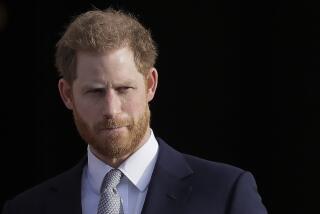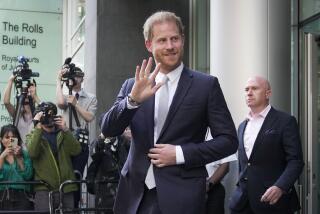Britain OKs press regulation charter
- Share via
LONDON — A plan to regulate the British press as a result of the country’s phone-hacking scandal was signed by Queen Elizabeth II on Wednesday despite the objections of publishers who sought a court order to block such a measure.
The royal charter approved by the queen and the nation’s major political parties calls for the creation of a watchdog group designed to curb the type of abuses revealed by the scandal. The practices include listening to the voicemails of crime victims, celebrities, royal family members and others, such as employees or relatives of people in the news.
But members of the news media are not obligated to sign the charter and many remain staunchly opposed to any restrictions on freedom of the press.
“It’s the end of 300 years of press freedom if you’ve got politicians deciding to judge how stiff the standards of regulation are,” Roger Alton, editor of the Times of London told the BBC’s morning news program. “Imagine this: in America a sentence coming out in the papers saying, ‘Last night both houses of Congress agreed [to] a new system to regulate the press.’”
Lawyers representing publishers said in court that British politicians did not give proper consideration to other proposals.
Publishing groups failed Wednesday in a last-minute attempt to stop a panel of politicians, known as the Privy Council, from approving the creation of the regulatory body. A judge ruled against the press groups’ bid for an injunction, saying the council’s decision was in the public interest.
Four major publishers groups form the Press Standards Board of Finance, which sought the injunction and announced it would appeal the judge’s decision. PressBof, as it is known, plans to go ahead with its own charter of press regulations.
The new government-sponsored charter is the culmination of two years of police investigation and public inquiry after the phone-hacking scandal broke in July 2011, revealing some journalists’ widespread use of illegal methods to obtain information.
The public inquiry led by High Court Judge Brian Leveson was prompted by Prime Minister David Cameron after revelations that journalists from the News Corp.-owned tabloid News of the World hacked into the cellphone messages of teenager Milly Dowler, who was kidnapped and killed in 2002. Leveson’s resulting report called for a new independent press body that would be respectful of press freedom but ultimately bound by law.
Supporters of the charter include Hacked Off, a lobbying group for victims of press intrusion. Recent polls also show strong support for greater control of the media.
The royal charter proposes a multi-tiered body to replace the Press Complaints Commission, a self-regulatory body. The new body would have stronger powers than the PCC and arbitration rights to demand fines of up to $1.4 million. It would be overseen by a panel of four to eight members, including representatives of the press but, unlike the PCC, no serving editors.
Several newspapers are adamant that they will not join the charter.
“The press obviously can choose to be subject to the royal charter or not.... I hope they will seek recognition,” Culture Secretary Maria Miller told the BBC.
Fraser Nelson, editor of the weekly Spectator, told the BBC that he and many colleagues wouldn’t be signing it. The press can accept regulation, he said, but “on its own terms, not because politicians say so.”
The charter developments coincided with the trial in London’s Central Criminal Court of Rebekah Brooks, a former News Corp. executive and editor of the defunct News of the World; Andy Coulson, a former chief press officer to Cameron and also a former editor of the tabloid; and six other former News Corp. editors and journalists, all facing charges related to phone hacking.
A prosecutor told the court that three former News of the World journalists — ex-news editor Greg Miskiw, ex-chief reporter Neville Thurlbeck and former reporter James Weatherup — and private investigator Glenn Mulcaire, who worked with the journalists, had already pleaded guilty to charges related to the scandal.
Stobart is a news assistant in The Times’ London bureau.
More to Read
Sign up for Essential California
The most important California stories and recommendations in your inbox every morning.
You may occasionally receive promotional content from the Los Angeles Times.










